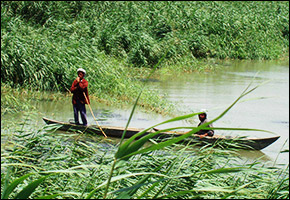The Stream, January 15: U.S. Midwest Water Levels
In the Midwest, low water levels are a growing economic concern for the region. CNN reports that the Great Lakes are expected to reach all-time lows in the coming months, and reached record lows in December of 2012. Cargo shipping industries have already been impacted by the past 13 years of dropping lake levels. As the waters get lower, the adverse effects reverberate to other industries, including sport fishing and tourism.
On the Mississippi river, the rain has brought some relief and a rise in levels reports CNN. The rise in levels came as a relief to barge traffic and restrictions were lifted after the U.S. Army Corps of Engineers removed rock formations in the river. The future of water levels on the Mississippi remain uncertain, as the Midwest is expected to face another summer of high temperatures and potentially another worrisome drought.
Australian State Caps Government Buybacks of Water for Environmental Returns
Flying in the face of the new Murray-Darling Basin Plan passed in Australia two months ago, the state of New South Wales has implemented a cap on the number of water licenses that the government will buy back from water users, reports Bloomberg. The state government has restricted buyback purchases to 3 percent per valley per decade, citing economic concerns. The new Murray-Darling Basin Plan raised the amount of water intended to be maintained in the environment. Government buybacks of licenses from water users are instrumental in achieving a greater return flow of water to the environment.
Mexico Suffers Mercury Pollution in Anticipation of New Laws
In the Coatzacoalcos river basin in southern Mexico, residents are drinking water with mercury pollution at levels 1.7 times higher than the U.S. EPA reference dose, reports IPS News. Policies governing the emissions and management of mercury pollution in Mexico are lacking or nonexistent. There is hope that the final rounds of negotiations this week for the International Treaty on Mercury will bring to fruition means of recourse and restitution for Mexico’s affected waters and communities.
The Stream is a daily digest spotting global water trends. To get more water news, follow Circle of Blue on Twitter and sign up for our newsletter.
is an editorial intern for Circle of Blue based out of Traverse City, Michigan. She holds a BA in International Relations from Michigan State University’s James Madison College. Her interests include water pricing, environmental economics and policy, and conflict mediation.






Leave a Reply
Want to join the discussion?Feel free to contribute!